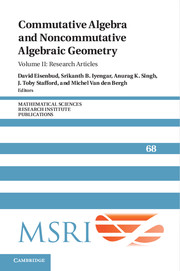Book contents
- Frontmatter
- Contents
- Preface
- When is a squarefree monomial ideal of linear type?
- Modules for elementary abelian groups and hypersurface singularities
- Ideals generated by superstandard tableaux
- Zariski topologies on stratified spectra of quantum algebras
- The derived category of a graded Gorenstein ring
- Singularities with respect to Mather–Jacobian discrepancies
- Reduction numbers and balanced ideals
- Unipotent and Nakayama automorphisms of quantum nilpotent algebras
- Formal fibers of prime ideals in polynomial rings
- Bounding the socles of powers of squarefree monomial ideals
- An intriguing ring structure on the set of d-forms
- On the subadditivity problem for maximal shifts in free resolutions
- The cone of Betti tables over a rational normal curve
- Adjoint associativity: an invitation to algebra in ∞-categories
Singularities with respect to Mather–Jacobian discrepancies
Published online by Cambridge University Press: 29 May 2025
- Frontmatter
- Contents
- Preface
- When is a squarefree monomial ideal of linear type?
- Modules for elementary abelian groups and hypersurface singularities
- Ideals generated by superstandard tableaux
- Zariski topologies on stratified spectra of quantum algebras
- The derived category of a graded Gorenstein ring
- Singularities with respect to Mather–Jacobian discrepancies
- Reduction numbers and balanced ideals
- Unipotent and Nakayama automorphisms of quantum nilpotent algebras
- Formal fibers of prime ideals in polynomial rings
- Bounding the socles of powers of squarefree monomial ideals
- An intriguing ring structure on the set of d-forms
- On the subadditivity problem for maximal shifts in free resolutions
- The cone of Betti tables over a rational normal curve
- Adjoint associativity: an invitation to algebra in ∞-categories
Summary
As is well known, the “usual discrepancy” is defined for a normal-Gorenstein variety. By using this discrepancy we can define a canonical singularity and a log canonical singularity. In the same way, by using a new notion, Mather– Jacobian discrepancy introduced in recent papers we can define a “canonical singularity” and a “log canonical singularity” for not necessarily normal or -Gorenstein varieties. In this paper, we show basic properties of these singularities, behavior of these singularities under deformations and determine all these singularities of dimension up to 2.
In birational geometry, canonical, log canonical, terminal and log terminal singularities play important roles. These singularities are all normalℚ-Gorenstein singularities and each step of the minimal model program is performed inside the category of normal ℚ-Gorenstein singularities. But in turn, from a purely singularity theoretic view point, the normal ℚ-Gorenstein property seems, in some sense, to be an unnecessary restriction for a singularity to be considered as a good singularity, because there are many “good” singularities without normal ℚ-Gorenstein property (for example, the cone over the Segre embedding ℙ1 x ℙ2 → ℙ5).
Information
- Type
- Chapter
- Information
- Commutative Algebra and Noncommutative Algebraic GeometryVolume 2: Research Articles, pp. 125 - 168Publisher: Cambridge University PressPrint publication year: 2015
Accessibility standard: Unknown
Why this information is here
This section outlines the accessibility features of this content - including support for screen readers, full keyboard navigation and high-contrast display options. This may not be relevant for you.Accessibility Information
- 1
- Cited by
